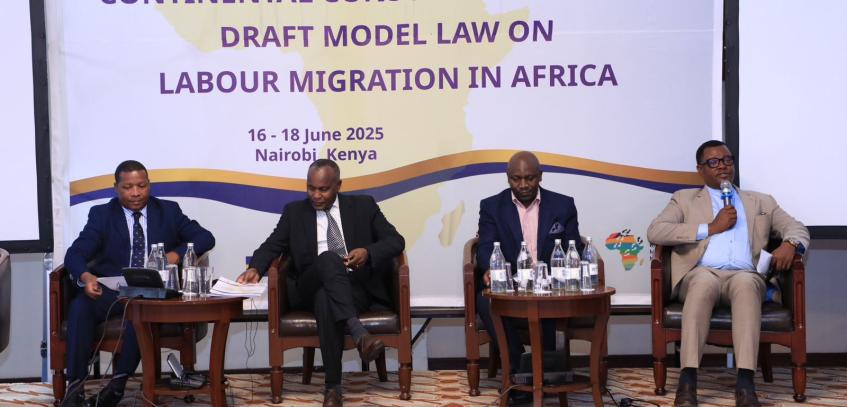The trade, customs and migration committee of the Pan-African Parliament and participants of the continental consultation on the draft labour migration model law have adopted a joint communiqué in Nairobi, on 18 June 2025. The communiqué supports the development of a Model Law on Labour Migration which aims to provide guidance to Member states in developing their national laws and harmonize national policies with international standards and continental frameworks. This milestone marks a significant step toward fair, safe, and rights-based labour migration governance and advancing protection of migrant workers across the continent.
Nairobi, Kenya— The Continental Consultation on the Draft Model Law on Labour Migration in Africa, held from 16–18 June 2025 in Nairobi, Kenya, concluded today with the adoption of a joint communiqué that reaffirms continental commitment to advance a harmonized, rights-based and gender sensitive legal framework for advancing labour migration governance in Africa.
Organized by the Pan-African Parliament (PAP), through its Committee on Trade Customs and Immigration Matters, in collaboration with the International Labour Organization (ILO), the consultation brought together parliamentarians from across the continent, representatives of the Kenyan Parliament and relevant African Union (AU) departments, organs, Regional Economic Communities (RECs), and relevant stakeholders from business, trade unions, civil society, academia and UN agencies.
A Collective Commitment to Governance Rooted in Rights
Participants reviewed and refined the Draft Model Law on Labour Migration, ensuring it is practical, adaptable, and aligned with international labour standards and human right instruments. The final communiqué reaffirms the Model Law is a crucial legal instrument to guide AU Member States in establishing legal frameworks that guarantee fair recruitment, protection of migrant workers’ rights, and access to social protection.
“Labour migration is a powerful driver of regional integration and development, but only when governed in a way that protects dignity, rights and opportunity,” said Hon. John B. Bideri, Chairperson of the PAP Committee. “This Model Law is our shared tool to ensure that.”
Hon. Bideri further emphasized that the Model Law will serve as a framework for AU Member States to develop or revise their national laws in line with international labour standards, in keeping with the PAP’s mandate to harmonize legislation across the continent.
Strong Technical Endorsement
Director of ILO Country Office for Ethiopia, Djibouti, Somalia, South Sudan and Sudan and Special Representative to the AU and UNECA, Mr. Khumbula Ndaba also added “Despite their contributions, many migrant workers face precarious conditions. The Model Law is our response to ensure labour mobility is productive, rights-based, and gender-responsive,”
“Africa’s youthful population is growing, and the Model Law offers a critical opportunity to build consensus around inclusive, Afrocentric migration governance,” said Wonesai Sithole, Regional Specialist, IOM.
Key Outcomes of the Consultation
Over the course of three days, participants engaged in expert presentations and intensive dialogue. They thoroughly reviewed the structure and content of the draft Model Law to ensure its clarity, practicality, and applicability across diverse legal contexts within AU Member States. The provisions were refined using expert inputs and aligned with the latest developments in legal and policy frameworks at national, regional, and international levels. Participants also submitted detailed comments and recommendations for integration into the draft to enhance its comprehensiveness and usability.
In addition, delegates explored potential barriers to effective national use of the Model Law, such as limited political will, implementation challenges, and resource constraints. They proposed solutions and emphasized the need for coordinated efforts by all stakeholders—governments, social partners, civil society, and RECs—to advance its use at national regional and continental level. The consultation strengthened continental collaboration and mobilized collective commitment to support domestic adoption.
The next steps in the process, include the presentation of the revised draft Model Law to the PAP Plenary for consideration and adoption, its subsequent recommendation to African Union policy organs, and extensive advocacy for domestication by Member States. This will require the support of national parliaments, relevant ministries, social partners, international institutions, and academia.
Participants commended the Government and People of Kenya for graciously hosting the consultation and acknowledged the PAP and the ILO for enabling broad-based and inclusive engagement. Appreciation was also conveyed to the Government of Sweden and the UK Foreign, Commonwealth & Development Office (FCDO) for their financial support through the Joint Labour Migration Programme (JLMP) and the Better Regional Migration Management (BRMM) initiative.
The consultation concluded with a strong call to action for sustained collaboration in finalizing, promoting domestication and implementation of the Model Law—positioning it as a practical tool to advance social justice, ensure decent work, and deepen regional integration across the continent.
For more information, contact:
Jeffrey ONGANGA - Media and Communications, Pan-African Parliament: jeffrey.onganga@panafricanparliament.org
Homa Mulisa EJETA - Communications Officer, ILO Country Office Addis Ababa: ejeta@ilo.org








